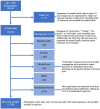Traditional activities and general and mental health of adult Indigenous peoples living off-reserve in Canada
- PMID: 38328543
- PMCID: PMC10847285
- DOI: 10.3389/fpubh.2023.1273955
Traditional activities and general and mental health of adult Indigenous peoples living off-reserve in Canada
Abstract
Introduction: We examined associations between traditional Indigenous activities and self-perceived general and mental health in adult Indigenous persons living off-reserve in Canada using the 2012 and 2017 Aboriginal Peoples Surveys (APS), the two most recent datasets. We utilized four traditional Indigenous activities including hunting, making clothes or footwear, making arts or crafts, and gathering wild plants to investigate these self-reported data.
Methods: Data from 9,430 and 12,598 respondents from the 2012 and 2017 APS, respectively, who responded to 15 questions concerning traditional activities were assessed using multivariable logistic regression to produce odds ratios (OR) and 95% confidence intervals (CI). Covariates included age, sex, education-level, income-level, Indigenous identity, residential school connection, ability to speak an Indigenous language, smoking status, and alcohol consumption frequency.
Results: Using the 2012 APS, clothes-making was associated with poor self-reported general (OR = 1.50, 95%CI: 1.12-1.99) and mental (OR = 1.59, 95%CI: 1.14-2.21) health. Hunting was associated with good mental health (OR = 0.71 95%CI: 0.56-0.93). Similarly, 2017 analyses found clothes-making associated with poor general health (OR = 1.25, 95%CI: 1.01-1.54), and hunting associated with good general (OR = 0.76, 95%CI: 0.64-0.89) and mental (OR = 0.69, 95%CI: 0.58-0.81) health. Artmaking was associated with poor general (OR = 1.37, 95%CI: 1.17-1.60) and mental (OR = 1.85, 95%CI: 1.58-2.17) health.
Conclusion: Hunting had protective relationships with mental and general health, which may reflect benefits of participation or engagement of healthier individuals in this activity. Clothes-making and artmaking were associated with poor general and poor mental health, possibly representing reverse causation as these activities are often undertaken therapeutically. These findings have implications for future research, programs and policies concerning Indigenous health.
Keywords: Indigenous health; epidemiology; mental health; public health; traditional Indigenous activities.
Copyright © 2024 Kassem, Harris, Edwards-Wheesk and Liberda.
Conflict of interest statement
The authors declare that the research was conducted in the absence of any commercial or financial relationships that could be construed as a potential conflict of interest.
Figures
Comment on
-
The correlates of current smoking among adult Métis: Evidence from the Aboriginal Peoples Survey and Métis Supplement.Can J Public Health. 2015 Jun 18;106(5):e271-6. doi: 10.17269/cjph.106.5053. Can J Public Health. 2015. PMID: 26451987 Free PMC article.
References
-
- Immigration citizenship. Discover Canada - Canada's History. (2015). Available oline at: https://www.canada.ca/en/immigration-refugees-citizenship/corporate/publ... (accessed November 8, 2023).
-
- First Nations Health Authority . Our History, Our Health. Available online at: https://www.fnha.ca/wellness/wellness-for-first-nations/our-history-our-... (accessed November 8, 2023).
-
- Facing History & Ourselves,. Dispossession, Destruction, the Reserves. (2020). Available oline at: https://www.facinghistory.org/en-ca/resource-library/dispossession-destr... (accessed November 13, 2023).
-
- First, Nations Studies Program . The Indian Act. Available oline at: http://indigenousfoundations.arts.ubc.ca/the_indian_act/ (accessed November 8, 2023).
-
- Government of Canada . The Indian Act. 1999 Canada.
Publication types
MeSH terms
LinkOut - more resources
Full Text Sources
Medical
Miscellaneous



